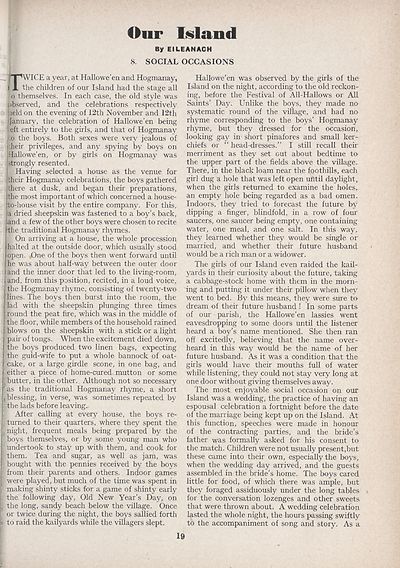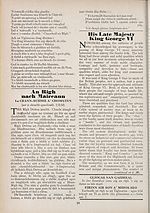An Comunn Gàidhealach Publications > Gaidheal > Volumes 46--48, January 1951--December 1953
(253) Page 19
Download files
Complete book:
Individual page:
Thumbnail gallery: Grid view | List view

Our Island
By El LEAN ACH
8. SOCIAL OCCASIONS
JT'WICE a year, at Hallowe’en and Hogmanay,
1 X the children of our Island had the stage all
fo themselves. In each case, the old style was
Jjbserved, and the celebrations respectively
add on the evening of 12th November and 12th
January, the celebration of Hallowe’en being
| eft entirely to the girls, and that of Hogmanay
p.o the boys. Both sexes were very jealous of
iheir privileges, and any spying by boys on
Pallowe’en, or by girls on Hogmanay was
drongly resented.
: Having selected a house as the venue for
their Hogmanay celebrations, the boys gathered
(there at dusk, and began their preparations,
(the most important of which concerned a house-
to-house visit by the entire company. For this,
a dried sheepskin was fastened to a boy’s back,
and a few of the other boys were chosen to recite
the traditional Hogmanay rhymes,
y On arriving at a house, the whole procession
halted at the outside door, which usually stood
iopen. One of the boys then went forward until
he was about half-way between the outer door
and the inner door that led to the living-room,
land, from this position, recited, in a loud voice,
the Hogmanay rhyme, consisting of twenty-two
'lines. The boys then burst into the room, the
i lad with the sheepskin plunging three times
(round the peat fire, which was in the middle of
the floor, while members of the household rained
. (blows on the sheepskin with a stick or a light
I pair of tongs. When the excitement died down,
the boys produced two linen bags, expecting
the guid-wife to put a whole bannock of oat¬
cake, or a large girdle scone, in one bag, and
| either a piece of home-cured mutton or some
t'butter, in the other. Although not so necessary
p as the traditional Hogmanay rhyme, a short
L blessing, in verse, was sometimes repeated by
i the lads before leaving.
I After calling at every house, the boys re-
| turned to their quarters, where they spent the
1 night, frequent meals being prepared by the
[[‘boys themselves, or by some young man who
| undertook to stay up with them, and cook for
| them. Tea and sugar, as well as jam, was
I bought with the pennies received by the boys
Jf from their parents and others. Indoor games
| were played, but much of the time was spent in
f making shinty sticks for a game of shinty early
, the following day, Old New Year’s Day, on
| the long, sandy beach below the village. Once
r or twice during the night, the boys sallied forth
| to raid the kailyards while the villagers slept.
Hallowe’en was observed by the girls of the
Island on the night, according to the old reckon¬
ing, before the Festival of All-Hallows or All
Saints’ Day. Unlike the boys, they made no
systematic round of the village, and had no
rhyme corresponding to the boys’ Hogmanay
rhyme, but they dressed for the occasion,
looking gay in short pinafores and small ker¬
chiefs or “ head-dresses.” I still recall their
merriment as they set out about bedtime ta
the upper part of the fields above the village.
There, ip the black loam near the foothills, each
girl dug a hole that was left open ufttil daylight,
when the girls returned to examine the holes,
an empty hole being regarded as a bad omen.
Indoors, they tried to forecast the future by
dipping a finger, blindfold, in a row of four
saucers, one saucer being empty, one containing
water, one meal, and one salt. In this way,
they learned whether they would be single or
married, and whether their future husband
would be a rich man or a widower.
The girls of our Island even raided the kail¬
yards in their curiosity about the future, taking
a cabbage-stock home with them in the morn¬
ing and putting it under their pillow when they
went to bed. By this means, they were sure ta
dream of their future husband ! In some parts
of our parish, the Hallowe’en lassies went
eavesdropping to some doors until the listener
heard a boy’s name mentioned. She then ran
off excitedly, believing that the name over¬
heard in this way would be the name of her
future husband. As it was a condition that the
girls would have their mouths full of water
while listening, they could not stay very long at
one door without giving themselves away.
The most enjoyable social occasion on our
Island was a wedding, the practice of having an
espousal celebration a fortnight before the date
of the marriage being kept up on the Island. At
this function, speeches were made in honour
of the contracting parties, and the bride’s
father was formally asked for his consent to
the match. Children were not usually present,but
these came into their own, especially the boys,
when the wedding day arrived, and the guests
assembled in the bride’s home. The boys cared
little for food, of which there was ample, but
they foraged assiduously under the long tables
for the conversation lozenges and other sweets
that were thrown about. A wedding celebration
lasted the whole night, the hours passing swiftly
to the accompaniment of song and story. As a
By El LEAN ACH
8. SOCIAL OCCASIONS
JT'WICE a year, at Hallowe’en and Hogmanay,
1 X the children of our Island had the stage all
fo themselves. In each case, the old style was
Jjbserved, and the celebrations respectively
add on the evening of 12th November and 12th
January, the celebration of Hallowe’en being
| eft entirely to the girls, and that of Hogmanay
p.o the boys. Both sexes were very jealous of
iheir privileges, and any spying by boys on
Pallowe’en, or by girls on Hogmanay was
drongly resented.
: Having selected a house as the venue for
their Hogmanay celebrations, the boys gathered
(there at dusk, and began their preparations,
(the most important of which concerned a house-
to-house visit by the entire company. For this,
a dried sheepskin was fastened to a boy’s back,
and a few of the other boys were chosen to recite
the traditional Hogmanay rhymes,
y On arriving at a house, the whole procession
halted at the outside door, which usually stood
iopen. One of the boys then went forward until
he was about half-way between the outer door
and the inner door that led to the living-room,
land, from this position, recited, in a loud voice,
the Hogmanay rhyme, consisting of twenty-two
'lines. The boys then burst into the room, the
i lad with the sheepskin plunging three times
(round the peat fire, which was in the middle of
the floor, while members of the household rained
. (blows on the sheepskin with a stick or a light
I pair of tongs. When the excitement died down,
the boys produced two linen bags, expecting
the guid-wife to put a whole bannock of oat¬
cake, or a large girdle scone, in one bag, and
| either a piece of home-cured mutton or some
t'butter, in the other. Although not so necessary
p as the traditional Hogmanay rhyme, a short
L blessing, in verse, was sometimes repeated by
i the lads before leaving.
I After calling at every house, the boys re-
| turned to their quarters, where they spent the
1 night, frequent meals being prepared by the
[[‘boys themselves, or by some young man who
| undertook to stay up with them, and cook for
| them. Tea and sugar, as well as jam, was
I bought with the pennies received by the boys
Jf from their parents and others. Indoor games
| were played, but much of the time was spent in
f making shinty sticks for a game of shinty early
, the following day, Old New Year’s Day, on
| the long, sandy beach below the village. Once
r or twice during the night, the boys sallied forth
| to raid the kailyards while the villagers slept.
Hallowe’en was observed by the girls of the
Island on the night, according to the old reckon¬
ing, before the Festival of All-Hallows or All
Saints’ Day. Unlike the boys, they made no
systematic round of the village, and had no
rhyme corresponding to the boys’ Hogmanay
rhyme, but they dressed for the occasion,
looking gay in short pinafores and small ker¬
chiefs or “ head-dresses.” I still recall their
merriment as they set out about bedtime ta
the upper part of the fields above the village.
There, ip the black loam near the foothills, each
girl dug a hole that was left open ufttil daylight,
when the girls returned to examine the holes,
an empty hole being regarded as a bad omen.
Indoors, they tried to forecast the future by
dipping a finger, blindfold, in a row of four
saucers, one saucer being empty, one containing
water, one meal, and one salt. In this way,
they learned whether they would be single or
married, and whether their future husband
would be a rich man or a widower.
The girls of our Island even raided the kail¬
yards in their curiosity about the future, taking
a cabbage-stock home with them in the morn¬
ing and putting it under their pillow when they
went to bed. By this means, they were sure ta
dream of their future husband ! In some parts
of our parish, the Hallowe’en lassies went
eavesdropping to some doors until the listener
heard a boy’s name mentioned. She then ran
off excitedly, believing that the name over¬
heard in this way would be the name of her
future husband. As it was a condition that the
girls would have their mouths full of water
while listening, they could not stay very long at
one door without giving themselves away.
The most enjoyable social occasion on our
Island was a wedding, the practice of having an
espousal celebration a fortnight before the date
of the marriage being kept up on the Island. At
this function, speeches were made in honour
of the contracting parties, and the bride’s
father was formally asked for his consent to
the match. Children were not usually present,but
these came into their own, especially the boys,
when the wedding day arrived, and the guests
assembled in the bride’s home. The boys cared
little for food, of which there was ample, but
they foraged assiduously under the long tables
for the conversation lozenges and other sweets
that were thrown about. A wedding celebration
lasted the whole night, the hours passing swiftly
to the accompaniment of song and story. As a
Set display mode to:
![]() Universal Viewer |
Universal Viewer | ![]() Mirador |
Large image | Transcription
Mirador |
Large image | Transcription
| An Comunn Gàidhealach > An Comunn Gàidhealach Publications > Gaidheal > Volumes 46--48, January 1951--December 1953 > (253) Page 19 |
|---|
| Permanent URL | https://digital.nls.uk/127506709 |
|---|
| Description | This contains items published by An Comunn, which are not specifically Mòd-related. It includes journals, annual reports and corporate documents, policy statements, educational resources and published plays and literature. It is arranged alphabetically by title. |
|---|
| Description | A collection of over 400 items published by An Comunn Gàidhealach, the organisation which promotes Gaelic language and culture and organises the Royal National Mòd. Dating from 1891 up to the present day, the collection includes journals and newspapers, annual reports, educational materials, national Mòd programmes, published Mòd literature and music. |
|---|---|
| Additional NLS resources: |
|

